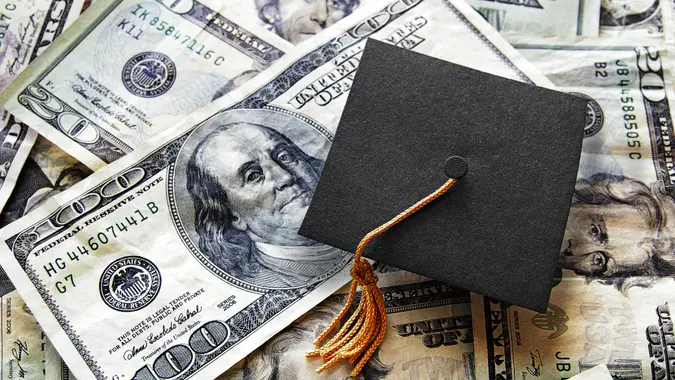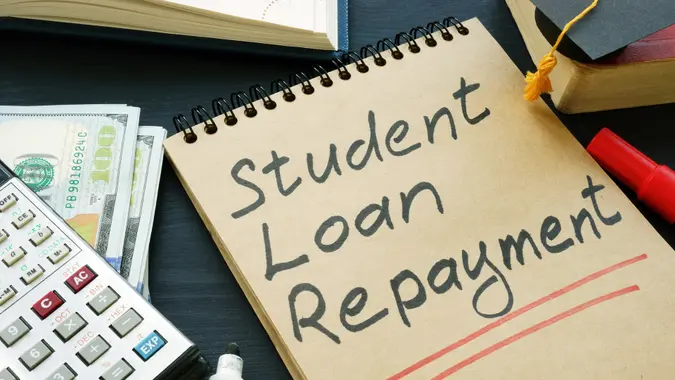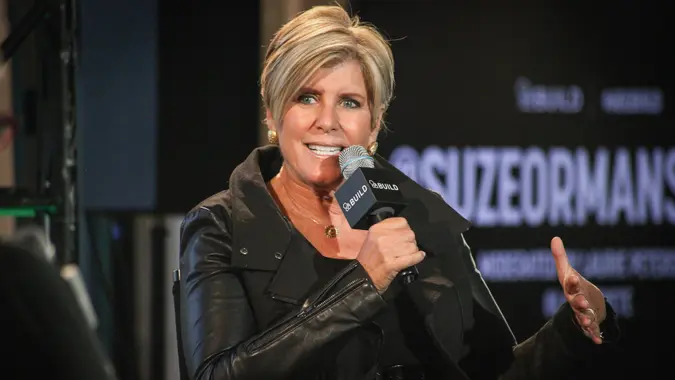Will the Presidential Election Change Anything About Student Loans?

Commitment to Our Readers
GOBankingRates' editorial team is committed to bringing you unbiased reviews and information. We use data-driven methodologies to evaluate financial products and services - our reviews and ratings are not influenced by advertisers. You can read more about our editorial guidelines and our products and services review methodology.

20 Years
Helping You Live Richer

Reviewed
by Experts

Trusted by
Millions of Readers
If you have outstanding student loans, you’re probably wondering what November’s election will bring. Will your student loans be forgiven? Will the interest go up? During President Biden’s term, he has approved $146 billion in student debt relief, which has benefited millions of Americans. Additionally, President Biden has outlined more plans that would continue to cancel student debt for more people.
If your student loan debt hasn’t been forgiven yet, you’re probably wondering whether it ever will be under a second Biden term — and what it would mean if former President Trump were to win in the upcoming election. GOBankingRates reached out to political experts to get their take on what could be on the horizon for student loans after the 2024 presidential election.
Student Loans Under Biden
If President Biden were to be reelected, here is what could happen with your student loans.
More Loan Forgiveness
As noted to above, President Biden has forgiven billions in student loan debt since he took office. Chuck Warren, the host of political podcast “Breaking Battlegrounds,” said that Americans can expect that trend to continue. “Joe Biden has signaled support for canceling up to $10,000 in federal student loan debt per borrower. There have also been talks about larger-scale forgiveness for those who attended public colleges or universities, HBCUs, and other minority-serving institutions,” he said.
However, Michael Montgomery, a political scientist who currently teaches at the University of Michigan-Dearborn, cautioned that not everyone with student loan debt can expect forgiveness.
“If Biden wins the White House without Democratic majorities in Congress, expect to see more of the same: a search for ways to implement loan forgiveness under executive authority that will produce some level relief for many but far from all borrowers,” he said.
Expanded Income-Driven Repayment Plans
Some student loan repayment plans are based on how much the borrower is earning. Because of this, for some borrowers, their monthly student loan payment can be very low.
Warren said that Biden might build on these plans to ease the loan burden for those with lower incomes. “The income-driven repayment plans under Biden’s administration might further simplify this approach by probably even reducing borrowers’ share of discretionary income or shortening the period before achieving total remission,” he said.
Simplified Public Service Loan Forgiveness
Currently, in order to qualify for Public Service Loan Forgiveness (PSLF), you first have to make 120 payments on direct loans while working full-time at a public service organization. Then, you can apply to have the remainder of your loan forgiven.
Under a second Biden term, Warren said this program might be improved upon to either reduce the amount of payments that have to be made or include more public servants. “PSLF could be made easier and expanded upon those who make it possible for more public servants to qualify for loan forgiveness after 10 years of qualifying payments,” he said.
Free Community College
President Biden has supported the idea of free community college, which could make education much more accessible, according to Warren. “This could help community college students save a fortune on tuition fees and lower their debt burdens, especially if they are pursuing two-year degrees or beginning at community colleges and then transferring to four-year institutions,” he said.
Student Loans Under Trump
If Trump wins, here are the possibilities.
Loan Repayment Simplification
Warren said how borrowers pay off their loans could become more consolidated. “Donald Trump’s earlier suggestions featured merging different repayment plans into one income-driven plan capped at 12.5% of borrowers’ earnings with forgiveness after 15 and 30 years for undergraduates and grad schoolers correspondingly,” he explained.
More Focus on Vocational and Trade Schools
In 2020, then-President Trump proposed a $900 million increase in education spending to teach trades. Warren said that, if reelected, Trump could continue to support trade education in lieu of undergraduate college.
“It is possible that Trump could adopt policies that promote trade schools and vocational training as substitutes for four-year colleges, hence reducing the need for student loans in these areas,” he said.
Reduced Federal Involvement
“The federal government’s role in student lending may decrease, which would mean increased responsibilities of private lenders and states as a result,” Warren said. This means borrowers with private loans might see changes in interest rates depending on what happens with federal loans.
Return to Previous Regulations
“Trump’s administration might go on with the practice of easing rules established by Obama’s regime towards proprietary colleges, which will lead to changes in borrowing for students studying there,” Warren said.
More From GOBankingRates
 Written by
Written by  Edited by
Edited by 
























